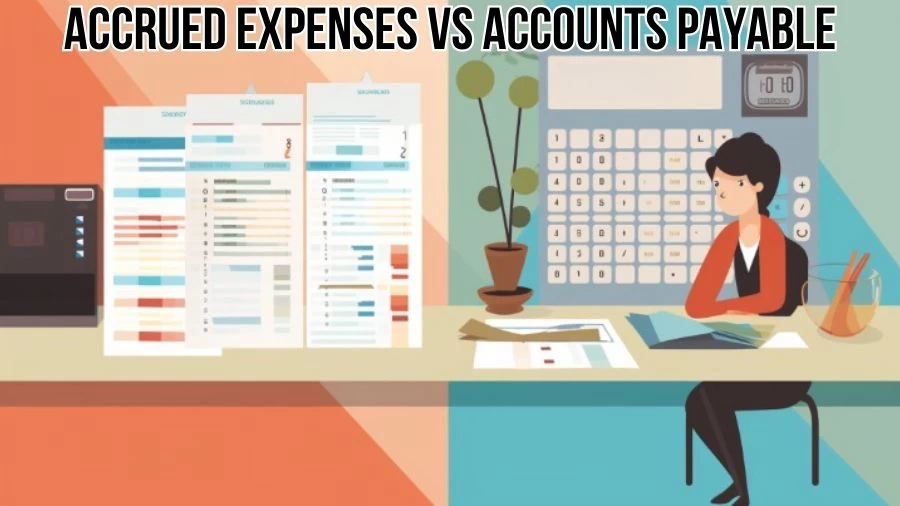
Accrued Expenses Vs Accounts Payable, What is the Difference Between Accrued Expenses and Accounts Payable?
Comparing Accrued Expenses and Accounts Payable: Navigating future financial commitments and immediate obligations in accrual accounting, with distinct characteristics and impact on balance sheets.
by Kowsalya
Published Aug 18, 2023 | Updated Aug 18, 2023 | 📖 10 min read
On This Page
- Accrued Expenses Vs Accounts Payable
- What is the Difference Between Accrued Expenses and Accounts Payable?
- What Are Accrued Expenses?
- What Are Accounts Payable?
- Is Accrued Expense Payable?
- What Are Examples of Accounts Payable?
- What Are Examples of Accrued Expenses?
- How Are Accrued Expenses Recorded?
- What Are the Advantages and Disadvantages of Accrued Expenses?
Accrued Expenses Vs Accounts Payable
Businesses must be diligent in recording past expenses, as these costs materialize as future obligations. Accrual accounting, the overarching term for managing such liabilities, encompasses two techniques: accrued expenses and accounts payable.
Both these approaches pertain to the financial obligations that enterprises accumulate through routine operations, yet they possess distinct characteristics. Accrued expenses denote liabilities that amass gradually and are earmarked for forthcoming settlement. Conversely, accounts payable represent immediate financial responsibilities that are slated for disbursement in the imminent future. This article delves into a more comprehensive exploration of these two categories within the balance sheet framework.
Accrued expenses and accounts payable stand as dual methodologies that facilitate the monitoring of cumulative expenditures within the purview of accrual accounting. Accrued expenses reflect obligations that accrue progressively, their settlement looming on the horizon. On the contrary, accounts payable signify liabilities primed for satisfaction in the impending short term.
The quantum of liability attached to an accrued expense is subject to change, potentially based on estimates, whereas accounts payable carry a fixed value. Adjustments and recording of accrued expenses transpire at the conclusion of an accounting period, whereas accounts payable manifest on the balance sheet concurrent with the procurement of goods and services.
What is the Difference Between Accrued Expenses and Accounts Payable?
Here are the differences between accrued expenses and accounts payable elaborated:
Nature of Liability:
- Accrued Expenses: These represent the total liability for goods and services that a company has utilized but hasn't yet received an invoice or bill for. The costs are recorded even before the invoice is received, and they might be estimated initially, with adjustments made once the actual invoice is obtained.
- Accounts Payable: Accounts payable denote the entire amount of short-term debt a company owes to its creditors for goods or services acquired on credit. In this case, the vendor's or supplier's invoices have been received and documented. Accounts payable should accurately reflect the sum owed as per the received invoices.
Recipient of Payment:
- Accrued Expenses: These are payments owed to various entities such as employees, property owners, and banks. Examples include salaries, rent, and loan interest.
- Accounts Payable: The payments are owed to creditors, which primarily include suppliers and vendors from whom goods and services have been purchased on credit.
Occurrence:
- Accrued Expenses: These liabilities arise from regular and ongoing occurrences, like rent payments and loan interest payments.
- Accounts Payable: Obligations under accounts payable occur specifically when a business acquires goods or services on credit from its suppliers or vendors.
Timing of Recognition:
- Accrued Expenses: Recognition of accrued expenses happens before the invoice or bill is received, with potential estimates being adjusted later to match the actual amounts.
- Accounts Payable: These are recognized once the vendor's or supplier's invoices are received and documented by the company. The recorded payables should accurately represent the exact amounts mentioned in the invoices.
|
|
Accrued Expense |
Accounts Payable |
|
Types |
Employee wages, rent, and loan interest |
Supplies, raw materials, and any other orders made with suppliers and vendors |
|
Accounting |
As current liabilities on the balance sheet |
As accounts payable on the balance sheet |
|
Realization |
At the end of the accounting period |
When the expense is incurred, such as the time an order is placed |
|
Payable to |
Employees, property owners, and banks |
Suppliers, vendors, and other creditors |
|
Occurrence |
Regular occurrences for all companies |
When purchases/orders are made on credit |
What Are Accrued Expenses?
Accrued expenses encompass payments that a company is bound to make in the forthcoming period for goods and services already received. To simplify, a company acquires a product or service and, as a result, accrues an expense. Although this expense is recorded in the financial records, the actual payment is deferred to a later date.
The term "accrued" signifies the process of augmentation or accumulation. Therefore, when a company accumulates expenses, it signifies an augmentation in its pending payments. Within the accrual accounting framework, expenses are acknowledged when they are incurred, irrespective of the timing of actual payment.
Also referred to as "accrued liabilities," these expenses find manifestation on a company's balance sheet, typically categorized as current liabilities. Accrued liabilities undergo adjustments and acknowledgment on the balance sheet's closure at the culmination of each accounting interval. Any requisite modifications serve to document goods and services that have been received but are yet to be invoiced.
What Are Accounts Payable?
The term "accounts payable" (AP) pertains to the ongoing financial obligations of a company. These are typically short-term financial commitments that necessitate settlement within a specific timeframe, usually spanning up to 12 months from the point of expense occurrence. In essence, these represent short-term promissory notes issued by entities sending out bills for payment. A failure to honor these commitments can lead to default, signifying an inability to meet debt repayment obligations.
Accounts payable essentially embody an extension of credit from suppliers to manufacturers. This mechanism empowers the manufacturer to generate revenue through the utilization of supplies or inventory, thereby facilitating the eventual payment to the supplier. In essence, companies gain the flexibility to remunerate their suppliers at a later date. This holds true for manufacturers engaging in the purchase of supplies or inventory from their suppliers. In simpler terms, suppliers provide leniency in payment terms.
Accounts payable (often referred to as "payables") might encompass payment deadlines set for 30, 60, or 90 days in the future. As such, they qualify as current liabilities within a company's financial landscape. The recognition of these payables on the balance sheet transpires when a company procures goods or services on a credit basis. This process involves a double-entry mechanism on the general ledger:
- A credit entry is made in the company's accounts payable section upon receipt of the invoice.
- An offsetting debit entry is recorded under the expense account pertaining to the credit-based purchase.
Is Accrued Expense Payable?
The "Accrued Expenses Payable" is a specific liability account designed to track outstanding amounts that a company owes, even though the corresponding invoices from vendors haven't been received or processed in the Accounts Payable system by the conclusion of the accounting period. Essentially, accrued expenses are financial obligations arising from incurred expenses that haven't been settled yet.
These obligations are documented as a liability within the company's balance sheet. Furthermore, they are acknowledged as actual expenditures within the income statement at the point of their occurrence.
To elaborate, the "Accrued Expenses Payable" account serves as a temporary placeholder for expenses that the company knows it is liable for, but the formal billing process hasn't been finalized. This situation might arise, for instance, when the accounting period ends before all vendor invoices have been received or processed. By recording these accrued expenses as liabilities, the company reflects its obligation to fulfill these payments in the near future.
It's important to understand that while accrued expenses are recorded as liabilities, they also have an impact on the income statement. As these expenses are incurred in the normal course of business operations, they are recognized as expenditures on the income statement. This duality of recording both as a liability and as an expense captures the financial reality that these obligations exist even though the corresponding invoices are pending.
The "Accrued Expenses Payable" account enables companies to properly account for financial obligations resulting from incurred expenses that are yet to be formally billed. These accrued expenses are marked as liabilities on the balance sheet, and their occurrence as actual expenditures is duly noted on the income statement. This meticulous tracking ensures that a comprehensive representation of the company's financial position is maintained.
What Are Examples of Accounts Payable?
Accounts payable encompass immediate financial obligations that businesses undertake. This includes various instances such as credit-based purchases from suppliers, ongoing subscriptions, and scheduled installment payments for goods or services that are yet to be delivered. Essentially, accounts payable embody the imminent expenses that require settlement within a relatively short span, generally not exceeding 12 months.
These liabilities encapsulate the fiscal commitments a company owes to external entities, capturing a snapshot of its short-term financial responsibilities. This pivotal aspect of financial management ensures that companies uphold their commitments and effectively manage their cash flow dynamics.
What Are Examples of Accrued Expenses?
In the context of the company's salary payments, a specific practice is followed. The company compensates its employees for services rendered in the preceding month on the initial day of the subsequent month.
To elucidate, those employees working throughout November will receive their remuneration in December. However, if the income statement for December is prepared without accounting for the upcoming salary payments, the accrued expenses pertaining to employee services for December will be overlooked.
Given that the company has, in reality, accumulated salary expenses for all 12 months, an essential adjusting journal entry is executed during the accounting period's culmination, specifically for the last month's outlays. This entry, marked as of December 31, encompasses a debit in the salary expenses section of the income statement and a corresponding credit in the salaries payable segment of the balance sheet.
Subsequently, when the company's accounting division receives the invoice detailing the complete salary sum due, the accounts payable entry is credited. Accounts payable reside within the current liabilities segment of the balance sheet, signifying the company's short-term financial obligations. Upon settling the debt, the accounts payable entry is debited, and a credit entry is made in the cash account. This meticulous process ensures accurate financial reporting and aligns the company's accounts with its actual fiscal undertakings.
How Are Accrued Expenses Recorded?
An accrued expense, sometimes referred to as an accrued liability, is a fundamental concept in accounting. It pertains to an expense that is acknowledged in a company's financial records before the actual payment is made. The recognition of this expense occurs during the accounting period in which it is incurred. This practice aligns with the principle of accurately reflecting financial activities in the books as they occur.
Accrued expenses essentially signify the company's commitment to settle forthcoming financial obligations, even though the disbursement hasn't happened yet. This commitment is reflected in the company's balance sheet as a current liability, showcasing the company's short-term obligations. The inclusion of accrued expenses in financial reporting ensures a comprehensive and precise depiction of a company's financial standing, accounting for both its incurred costs and its future financial commitments.
What Are the Advantages and Disadvantages of Accrued Expenses?
Advantages:
- Enhances Financial Alignment: Accrual accounting can better synchronize financial records with the timing of actual business transactions, presenting a more accurate representation of a company's financial health.
- Consistent Month-over-Month Statements: By recognizing revenues and expenses when incurred, accrual accounting fosters consistent month-to-month financial statements, aiding in clearer trend analysis.
- Informed Decision-making: The method often yields more insightful data for managerial decisions and strategic planning, as it captures financial events closer to their occurrence.
- Regulatory Compliance: Accrual accounting adheres to external reporting standards, ensuring compliance with accounting regulations and providing transparent financial information to stakeholders.
Disadvantages:
- Resource Intensive: The preparation of accrual-based financial statements can demand more time and resources compared to the cash accounting method, potentially burdening smaller businesses.
- Risk of Misstatement: Accruals that aren't reversed or inadvertent duplications can pose a higher risk of financial misstatement, necessitating meticulous oversight.
- Complexity in Reporting: The blurring of cash usage and capital requirements might complicate financial reporting, potentially obscuring insights into liquidity and investment needs.
Accrued Expenses Vs Accounts Payable-FAQs
1. What are accrued expenses?
Accrued expenses refer to costs that a company has incurred but not yet paid for. These expenses are recognized in the financial statements during the period they are incurred, regardless of when the payment is made.
2. How are accrued expenses recorded?
Accrued expenses are recorded by creating an adjusting journal entry at the end of the accounting period. This entry debits the expense account and credits a liability account, typically named "Accrued Expenses Payable."
3. What are accounts payable?
Accounts payable represent the short-term liabilities a company owes to its vendors or suppliers for goods or services acquired on credit. These obligations arise from invoices received but not yet settled.
4. How are accounts payable recorded?
When a company receives an invoice from a vendor, an accounts payable entry is created by crediting the accounts payable account and debiting the expense account associated with the purchase.
5. How do accounts payable affect financial statements?
Accounts payable affect the balance sheet by increasing current liabilities, showcasing the company's short-term financial obligations. They also impact the income statement by decreasing expenses as payments are made.




